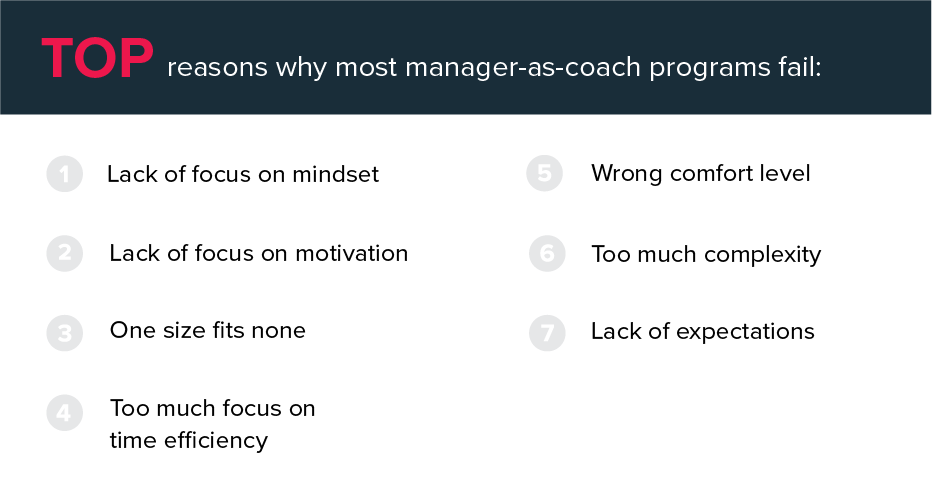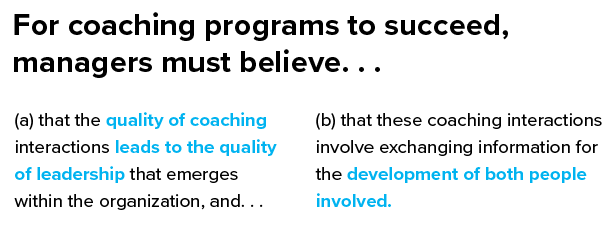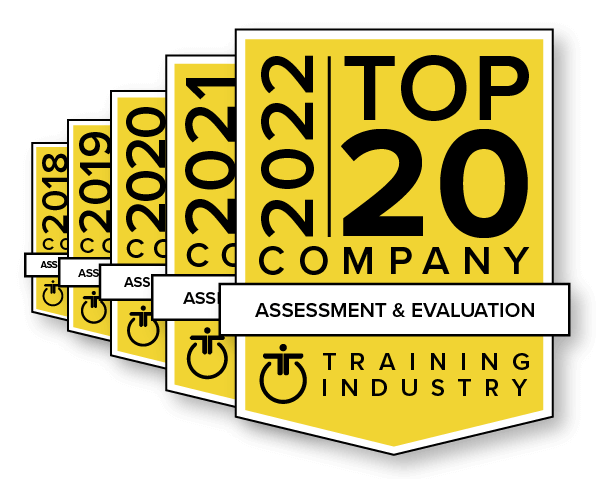Find out the pitfalls of failed manager-as-coach programs, and how to avoid them.
As it becomes more widely accepted that coaching is the best way to develop leaders in today’s world, companies are investing heavily into manager-as-coach training programs.
But teaching coaching skills to a manager isn’t an automatic win. In fact, most manager-as-coach programs fail. A number of studies have shown that coaching training programs are not preparing managers to coach effectively. One study of more than 200 organizations found that few managers are skilled at developmental coaching and often fail in their efforts to improve employees’ performance (Brandon Hall Group, 2015).
What negative outcomes happen when manager-as-coach programs fail?
A failed manager-as-coach program can be just as damaging as not offering a coaching training program at all.
Besides the loss of investment by the organization, some of the other negative outcomes of failed manager-as-coach programs include:

Managers are directing, not coaching.
This is when you get compliance without engagement. Team performance won’t be sustainable because employees can’t make key decisions without their manager being hands-on.
The only reason the employee makes a behavior change is that the manager tells them to, rather than because they feel internally motivated to change. This decreases engagement and weakens the leadership pipeline.

Teams can’t retain top talent.
Employees resign for other jobs when they don’t receive the growth opportunities they desire. This is especially true for today’s workforce. They demand growth and development and will leave to seek out an employer that delivers.

Employees aren’t motivated to develop.
Managers need to coach the employee with an understanding of how the employee wants to be coached. When development targets and new habits are not directly linked to employees’ individual sense of motivation, the ‘what’ is not connected to the ‘why,’ and employees don’t experience an internal drive for growth.

There is no accountability or follow-through.
When plans do not incorporate ongoing feedback check-ins, it’s impossible to track progress and development stalls. The bottom line is lack of follow-through is a broken promise, and broken promises degrade trust.
Why do most manager-as-coach programs fail?
Most manager-as-coach programs focus on the coaching skills, not the coaching relationship. The Core Strengths approach to coaching recognizes that there is a two-sided contract between manager and employee. The goals, motivations, strengths, and biases of both coach and employee must be taken into account for the coaching relationship to be successful.
But most coaching training programs don’t take these things into account, and they’re less successful as a result. These are the top reasons why most manager-as-coach programs fail:

- Lack of focus on mindset
Many manager-as-coach programs focus exclusively on coaching skills and neglect the coach’s mindset. Without training on their mindset, the manager won’t buy into coaching as a concept, nor believe it can improve team performance.
It always takes time to establish a trusting and open coaching relationship, but the process will go faster when the coach has the right mindset. For more on the coaching mindset, read our article, “How to Make Coaching in the Workplace Actually Work.” - Lack of focus on motivation
The manager needs to have a strong sense of self-awareness, including their own strengths and internal motivations, before they can be an effective coach. Most training programs don’t address the manager’s work on themselves at all.
Coaching training programs must help the manager see the connection between the anchor (the manager’s own internal motivation), the chain (the reasons why they do something), and the buoy (the behavior) so the manager can see this connection in the people they coach. When managers understand the importance of internal motivation, they’ll focus on that instead of on the behavior alone. Behavior change without internal motivation is very unlikely to stick. - One size fits none
Coaching approaches fail when they’re driven by the coach rather than tailored to the goals, motivations, and situation of each coaching relationship.
To tailor their coaching to each individual, it’s important for the manager to identify why they find some people easier to coach and some more difficult, and explore the patterns there. They need to know how they’re being perceived differently by each person and change the strengths they use to get different results. These are skills that take time and effort to master; however, the quality of coaching relationships will continue to improve as the manager develops these skills. - Too much focus on time efficiency
In a pressure-packed work environment, many managers believe that it’s faster to tell employees how to do something than to take the time to coach them. This may be true in the short term, but letting the employee learn through failure and coaching them through the failure will save time in the long run. It will also result in more competent and confident employees who are capable of taking on increasingly challenging work. - Wrong comfort level
When coaching is out of the manager’s comfort zone, they shy away from having frank performance conversations and delivering constructive feedback. They don’t feel confident in their own coaching ability. In other scenarios, managers are too comfortable. They overestimate their own coaching ability and incorrectly assume they have all the right answers.
Successful manager-as-coach programs will build the manager’s confidence while helping them challenge their assumptions. - Too much complexity
In a training program that fails, the insights and tips that managers need are buried in static resource guides where they’re not easily accessible. These coaching resources also don’t account for the manager’s internal motivations and different coaching styles.
Successful coaching training mirrors successful coaching in the workplace, where insights and tips are integrated into coaching conversations. - Lack of expectations
If the organization doesn’t set expectations for the manager upon completing the manager-as-coach training, and doesn’t set up a simple way to track the frequency, impact, and topics of coaching conversations, the program will fail.
The role of organizational culture in failed manager-as-coach programs
Developing strong coaching relationships within teams requires vulnerability, so vulnerability needs to be valued at the organization for coach training pro
Trainers can’t tell a manager to take the risk to be vulnerable if, within their organizational system, they might be punished for it. Before investing in any manager-as-coach program, leaders need to make vulnerability an institutional value.
One important aspect of vulnerability is the confidence that leadership comes from everywhere within the organization, not just people with leadership job titles. For coaching programs to succeed, managers must believe (a) that the quality of coaching interactions leads to the quality of leadership that emerges within the organization, and (b) that these coaching interactions involve exchanging information for the development of both people involved.

Don’t let your manager-as-coach program fail!
Core Strengths helps organizations like yours use proven science and simple technology so managers can coach teams to reach their potential.








